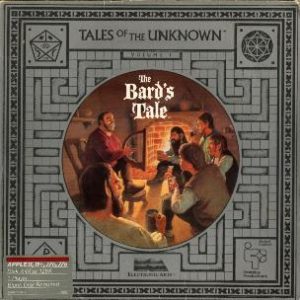774th played so far
Genre: Role-Playing
Platform: Various
Year of Release: 1985
Developer: Interplay Productions
Publisher: Electronic Arts
I only rarely play the old RPGs, even though I enjoy digging into that history sometimes. I’ve played Eye of the Beholder and Ultima VII fairly recently and Bard’s Tale fits the dungeon crawler mode of the former. I’ve heard the stories (and know I need to take a bard with me to actually finish the game) and seen how the series has recently been revived, but I’ve been a bit scared to jump into it after that. Now I’m going to try to see how the game actually works and whether I can get into this one.
Our Thoughts
Bard’s Tale is quite a tough game from the start – probably tougher at the start than it would be later. While you’re navigating the 3D town, things go on in semi-real time and you can get attacked as you walk around. The random encounters, at the very least, have a chance of killing you, and they can jump you before you’ve even had a chance to get yourself equipped. That could be a party killer on its own and it made me struggle. At least the default party comes pre-equipped (and with a bard) so it’s easier to start off and get something done.
What that was, was grinding on enemies walking down the street to get some extra gold (you need to bribe a bartender to get to the first dungeon and need to be able to pay for healing). The system isn’t too difficult. The front row can attack, the back row only with spells or ranged items. Dying means someone else steps forward (and resurrecting is extremely expensive early on, so not a great option anyway) but you usually just want to attack with a few. It’s all from the manual and, of course, FAQs, but it was a decent system, much like you’d expect from the era. It takes time to know the controls – the UI isn’t great – but I managed to figured it out after a while.
While the systems haven’t been too complicated yet – with some walkthrough help on what does what – the world itself is daunting. It all seems to take place in a single city, which is giant and sprawling – again, I had to have a map to follow where I needed to go, as the graphics made it easy to get lost and the battles can make you get turned around. Without a map, finding your way back is impossible. The dungeons are as big, but as they’re more open they feel a bit easier to explore. They’re still pretty big though, and I really could have gotten lost later.
Final Thoughts
In the end the Bard’s Tale hit the right spots: a big world with some good RPG elements. It’s as primitive as its age suggests, but it feels like it’s a step up from what came before and I can see how it might have influenced later games – this style stayed big for a long time. There’s a remake coming up and I think it’s time to try that, to experience the same feel but in a better UI.
